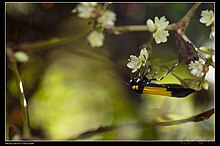Scaptesyle
Appearance
| Scaptesyle | |
|---|---|

| |
| Scaptestyle bicolor integra | |
| Scientific classification | |
| Domain: | Eukaryota |
| Kingdom: | Animalia |
| Phylum: | Arthropoda |
| Class: | Insecta |
| Order: | Lepidoptera |
| Superfamily: | Noctuoidea |
| Family: | Erebidae |
| Subfamily: | Arctiinae |
| Tribe: | Lithosiini |
| Subtribe: | Cisthenina |
| Genus: | Scaptesyle Walker, 1854 |
| Synonyms | |
| |
Scaptesyle is a genus of moths in the subfamily Arctiinae first described by Francis Walker in 1854.
Description
[edit]Palpi upturned reaching vertex of head. Antennae of male minutely ciliated. Tibia with long spurs. Forewings with stalked veins 4 and 5, vein 6 from below angle of cell and stalked veins 7,8 and 9. Hindwings with stalked veins 3,4 and 6,7. Vein 5 from above angle of cell and vein 8 from middle of cell.[1]
Species
[edit]- Scaptesyle aurigena Walker, 1863
- Scaptesyle buergersi Gaede, 1926
- Scaptesyle bicolor Walker, 1864
- Scaptesyle bifasciata Snellen, 1904
- Scaptesyle bipartita Rothschild, 1913
- Scaptesyle bizone Rothschild, 1912
- Scaptesyle dichotoma Meyrick, 1886
- Scaptesyle dictyota Meyrick, 1886
- Scaptesyle equidistans Lucas, 1890
- Scaptesyle fovealis Hampson, 1903
- Scaptesyle ixias Hampson, 1900
- Scaptesyle luzonica Swinhoe, 1916
- Scaptesyle middletoni (Turner, 1941)
- Scaptesyle mirabilis Hampson, 1900
- Scaptesyle monogrammaria Walker, 1862
- Scaptesyle plumosus Rothschild, 1912
- Scaptesyle sororigena Holloway, 2001
- Scaptesyle subtricolor van Eecke, 1927
- Scaptesyle tetramita Turner, 1940
- Scaptesyle thestias Snellen, 1904
- Scaptesyle tricolor Walker, 1854
- Scaptesyle violinitens Rothschild, 1912
Former species
[edit]- Scaptesyle aroa Bethune-Baker, 1904
- Scaptesyle incerta Semper, 1899
- Scaptesyle pseudoblabia Hampson, 1918
- Scaptesyle rothschildi Draudt, 1914
References
[edit]- ^ Hampson, G. F. (1894). The Fauna of British India, Including Ceylon and Burma: Moths Volume II. Taylor and Francis – via Biodiversity Heritage Library.
- Pitkin, Brian & Jenkins, Paul. "Search results Family: Arctiidae". Butterflies and Moths of the World. Natural History Museum, London.
